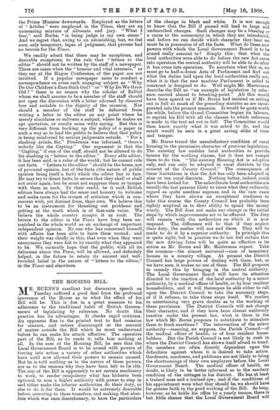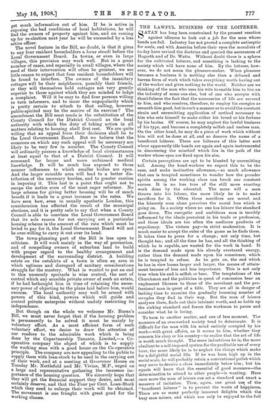THE HOUSING BILL.
MR. 'BURNS'S excellent but discursive speech on Tuesday suffered a good deal from the profound ignorance of the House as to what the effect of his Bill will be. This is due in a great measure to his adherence to the traditional habit of British Govern- ments of legislating by reference. No doubt this practice has its advantages. It checks rapid criticism. An opponent flies to the printed text to find occasion for censure, and retires discouraged at the amount of matter outside the Bill which he must understand before he can make his attack effective. The operative part of the Bill, as he reads it, tells him nothing at all. In the case of the Housing Bill, he sees that the Local Government Board is to be armed with powers of forcing into action a variety of other authorities which have until now allowed their powers to remain unused. But he is told nothing as to the nature of these powers, nor as to the reasons why they have been left to lie idle. The aim of the Bill is apparently to set certain machinery to work, to render compulsory what has hitherto been optional, to arm a higher authority with power to step in and either make the inferior authorities do their duty, or else to do it for them. It would be extremely desirable before assenting to these transfers, and making that abso- lute which was once discretionary to have the particulars of the change in black and white. It is not enough to know that the Bill if passed will lead to large and undescribed changes. Such changes may be a blessing or a curse to the community in which they are introduced, and before we can decide which character they bear we must be in possession of all the facts. What do these new powers with which the Local Government Board is to be armed really amount to ? Simply this : that what the local authorities were able to do before the new Act came into operation the central authority will be able to do after it has come into operation. To ascertain what this is, we must go to half-a-dozen Acts of Parliament and find out what the duties laid upon the local authorities really are, what it is that the new machine Parliament is asked to construct is designed to do. Well might Mr. Masterman describe the Bill as " au example of legislation by refer- ence carried almost to breaking-point." All this would have been spared us if Mr. Burns had insisted on setting out in full so much of the preceding statutes as are incor- porated into the present measure. It would be quite worth his while, before the Grand Committee begins its labours, to reprint his Bill with all the • clauses to which reference is made in the text set out iu full. The Committee would then know exactly what it was asked to do, and the result would be seen in a great saving alike of time and temper.
Mr. Burns traced the unsatisfactory condition of rural housing to the permissive character of-previous legislation. The existing law enables local authorities to provide houses for the working classes, but it does not compel them to do this. "The existing Housing Act is adoptive only, and can only be adopted in rural districts by the consent of the County Council." The consequence of these limitations is that the Act has only been adopted in nine or ten rural districts. Nothing better, indeed, could have been looked for. The subordinate local authorities are usually the last persons likely to incur what they ordinarily regard as quite needless expense, and in the rare cases where they have shown an exceptional readiness to take this course the County Council has probably been rightly sceptical as to their ability to spend the money wisely. The Bill does not make any change in the initial steps by which improvements are to be effected. The duty will remain with the authorities on which it is now • imposed. The difference will be that if they neglect their duty, the matter will not end there. They will be made to do it by a superior authority. In principle this is quite right, but in practice we do not feel certain that the new driving force will be quite as effective in its action as Mr. Burns and Mr. Masterman expect. Take the common—the almost universal—case of insanitary houses in a country village. At present the District Council has large powers of dealing with them, but, as we have seen, it makes no use of them. The Bill proposes to remedy this by bringing in the central authority. The Local Government Board will have its attention directed to the inaction of the local authority by a minor authority, by a medical officer of health, or by four resident householders, and it will thereupon be able either to call upon the District Council to take the necessary steps, or if it refuses, to take those steps itself. We confess to entertaining very grave doubts as to the working of these provisions. The District Councils will not change their character, and if they have been almost uniformly inactive under the present law, what is there in the law which Mr. Burns proposes to substitute to stimulate them to fresh exertions ? The intervention of the minor authority—meaning, we suppose, the Parish Council—of the medical officer of health, or of four resident house- holders. But the Parish Council is not likely to rush in where the District Council has shown itself afraid to tread. Its members are often directly dependent upon the defaulters against whom it is desired to take action. Gardeners, coachmen, and publicans are not likely to bring the shortcomings of their own employers before the Local Government Board. The medical officer of health, no doubt, is likely to be better informed as to the sanitary condition of the cottages in his district. He has at least a trained nose and a trained eye ; and if the conditions of his appointment were what they should be, we should have far greater faith in the good working of the Bill. So long, however, as he holds his office by a yearly tenure, there is but little chance that the Local Government Board will get much information out of him. If he is active in exposing the bad conditions of local habitations, he will find the owners of property against him, and on coming up for re-election next year he will be succeeded by a less active officer.
The novel feature in the Bill, no doubt, is that it gives to any four resident householders a locus standi before the Local Government Board. In towns, or even in large villages, this provision may work well. But in a great number of cases, and especially in small villages, where the need of their intervention will often be greatest, we see little reason to expect that four resident householders will be found to interfere. The owners of the insanitary cottages will be their neighbours, possibly their friends, or they will themselves hold cottages not very greatly superior to those against which they are minded to lodge a complaint. Will it be easy to find four persons willing to turn informers, and to incur the unpopularity which is pretty certain to attach to that calling, however public-spirited may be the motive of its exercise ? The amendment the Bill most needs is the substitution of the County Council for the District Council as the local authority with which the duty of taking action in all matters relating to housing shall first rest. We are quite willing that an appeal from their decisions shall lie to the Local Government Board. But we believe that the occasions on which any such appeal will be necessary are likely to be very few in number. The County Council will ordinarily possess a knowledge of local circumstances at least equal to that of a District Council. It will command far larger and more unbiassed medical knowledge. It will be much less exposed to those meaner influences to which smaller bodies are open. And the larger rateable area will lead to a better dis- tribution of the necessary burden, and to greater caution in imposing it. This last is a point that ought not to escape the notice even of the most eager reformer. No large scheme for giving better housing will be of much benefit if it leads to a great increase in the rates. We have seen how, even in usually apathetic London, this consideration has affected the result of the municipal elections, and it is pretty safe to say that when a County, Council is able to convince the Local Government Board that its sole reason for not carrying out a. particular housing scheme is the amount of the rate which must be levied to pay for it, the Local Government Board will not be over-willing to carry it out over its head.
The town-planning part of the Bill is less open to criticism. It will work mainly in the way of prevention, and of compelling owners of suburban land to build with proper regard to the healthy arrangement and development of the surrounding district. A building estate on the outskirts of a town is often an area in which ugliness and disregard of sanitary considerations struggle for the mastery. °What is wanted to put an end to this unseemly spectacle is wise control, the sort of control which any sensible private owner of such an estate, if be had bethought him in time of retaining the neces- sary power of objecting to the plans laid before him, would exercise. The local authority may well be armed with powers of this kind, powers which will guide and control private enterprise without unduly restricting its independence.
But though on the whole we welcome Mr. Burns's Bill, we must never forget that if the housing problem is permanently to be solved it must be mainly by voluntary effort. As a most efficient form of such voluntary effort, we desire to draw the attention of our readers to the admirable work which is being done by the Copartnership Tenants, Limited,—a Co- operative company, the object of which is to supply the working man with a good house on the Co-operative principle. The company are now appealing to the public to supply them with loan-stock to be used in the carrying out of their work, and at a meeting at Grosvenor House on Tuesday Mr. Nettlefold and Mr. Vivian, M.P., urged on a large and representative gathering the immense im- portance of the housing question. We sincerely, hope that they will get the financial support they desire, and most certainly deserve, and that the Four per Cent. Loan-Stock which they need to enlarge their work will be obtained. The movement is one fraught with great good for the working classes.















































 Previous page
Previous page